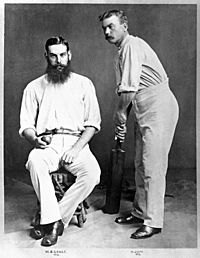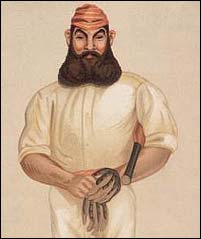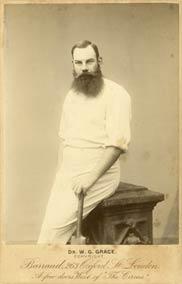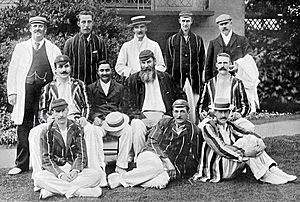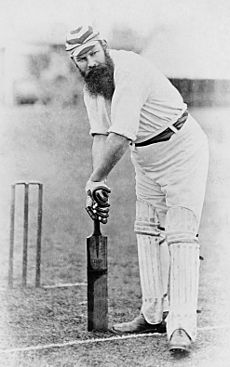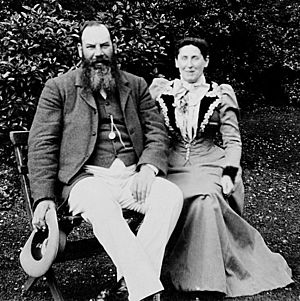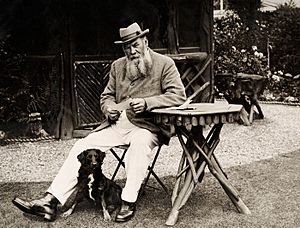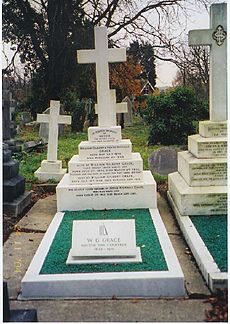W. G. Grace facts for kids
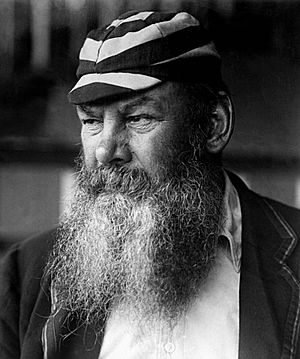
Grace photographed by George Beldam, c. 1902
|
||||||||||||||||||||||||||||||||||||||||
| Personal information | ||||||||||||||||||||||||||||||||||||||||
|---|---|---|---|---|---|---|---|---|---|---|---|---|---|---|---|---|---|---|---|---|---|---|---|---|---|---|---|---|---|---|---|---|---|---|---|---|---|---|---|---|
| Full name |
William Gilbert Grace
|
|||||||||||||||||||||||||||||||||||||||
| Born | 18 July 1848 Downend, near Bristol, England |
|||||||||||||||||||||||||||||||||||||||
| Died | 23 October 1915 (aged 67) Mottingham, Kent, England |
|||||||||||||||||||||||||||||||||||||||
| Nickname | W. G., The Doctor, The Champion, The Big 'Un, The Old Man | |||||||||||||||||||||||||||||||||||||||
| Batting | Right-handed | |||||||||||||||||||||||||||||||||||||||
| Bowling | Right-arm medium | |||||||||||||||||||||||||||||||||||||||
| Role | All-rounder | |||||||||||||||||||||||||||||||||||||||
| Relations |
|
|||||||||||||||||||||||||||||||||||||||
| International information | ||||||||||||||||||||||||||||||||||||||||
| National side | ||||||||||||||||||||||||||||||||||||||||
| Test debut (cap 24) | 6 September 1880 v Australia | |||||||||||||||||||||||||||||||||||||||
| Last Test | 1 June 1899 v Australia | |||||||||||||||||||||||||||||||||||||||
| Domestic team information | ||||||||||||||||||||||||||||||||||||||||
| Years | Team | |||||||||||||||||||||||||||||||||||||||
| 1869–1904 | Marylebone Cricket Club | |||||||||||||||||||||||||||||||||||||||
| 1870–1899 | Gloucestershire | |||||||||||||||||||||||||||||||||||||||
| 1900–1904 | London County | |||||||||||||||||||||||||||||||||||||||
| Career statistics | ||||||||||||||||||||||||||||||||||||||||
|
||||||||||||||||||||||||||||||||||||||||
|
Source: CricInfo, 28 May 2022
|
||||||||||||||||||||||||||||||||||||||||
William Gilbert Grace (born July 18, 1848 – died October 23, 1915) was an English cricketer. He was an amateur player who helped shape the sport. Many people think he was one of the greatest players ever.
Grace played first-class cricket for an amazing 44 seasons, from 1865 to 1908. During this time, he was the captain for England, Gloucestershire, and other teams.
He was good with both his right hand for batting and bowling. Grace was so good that he changed how cricket was played. He was an amazing all-rounder, meaning he was excellent at batting, bowling, and fielding. He is most famous for his batting skills. People say he invented modern batting. He usually started the batting for his team. He was known for being able to hit all kinds of shots. His skill level was thought to be unique at the time. He often captained his teams because he was so skilled and smart about the game.
Grace came from a family of cricketers. His older brother was E. M. Grace, and his younger brother was Fred Grace. In 1880, all three brothers played together for England. This was the first time three brothers played together in a Test cricket match. Grace also played other sports. He was a champion hurdler when he was young. He also played football for the Wanderers. Later in life, he enjoyed golf, lawn bowls, and curling.
He became a doctor in 1879. Even though he was an amateur cricketer, he made more money from cricket than any professional player. He was very competitive. He was one of the most famous people in England. But he was also known for being controversial because of his gamesmanship and how he made money.
Contents
- Early Life and Cricket Beginnings
- Grace's Cricket Career (1865–1908)
- Grace's Cricket Style and Approach
- Grace's Amateur Status and Earnings
- Grace's Personal Life and Medical Career
- Grace's Lasting Impact on Cricket
- See also
Early Life and Cricket Beginnings
Growing Up in a Cricket Family
W. G. Grace was born in Downend, near Bristol, on July 18, 1848. He was the eighth of nine children. His parents, Henry Mills Grace and Martha, loved cricket very much. They often talked about the game at home.
When W. G. was two, his family moved to a house called "The Chesnuts." It had a big orchard. His father cleared the orchard to make a cricket practice pitch. All nine Grace children, even the four girls, were encouraged to play. The girls and the dogs helped with fielding. Grace said he first held a cricket bat when he was two years old. He and his brothers learned their skills there. Their uncle, Alfred Pocock, was a great coach. Grace also lived like a normal country boy. He often threw stones at birds in the fields. He later said this helped him become a good outfielder.
Grace's School Days
Grace was not known for being a great student. He went to a few local schools. In 1863, he became very sick with pneumonia. His father took him out of school. After this illness, Grace grew very quickly. He reached his full height of 6 feet 2 inches (1.88 meters). He continued his education at home with tutors.
Grace never went to university. His father wanted him to become a doctor. Both Oxford University Cricket Club and Cambridge University Cricket Club wanted him to play for them. But his father did not allow it. Instead, he started at Bristol Medical School in October 1868, when he was 20.
How Grace Became a Cricket Star
Grace's father started the Mangotsfield Cricket Club in 1845. It later became the West Gloucestershire Cricket Club. The Grace family pretty much ran this club. Henry Grace arranged matches against the best club in the West Country, Lansdown Cricket Club.
Uncle Alfred Pocock was key in teaching the Grace brothers. He spent many hours coaching them. W. G.'s older brother, E. M., always used a full-size bat. This made him hit the ball across the field. Pocock wanted W. G. and Fred to play differently. He made smaller bats for them. He taught them to hit the ball straight and to defend well.
Grace said he saw his first big cricket match in 1854, when he was six. He played for the West Gloucestershire club when he was nine. The first time he scored a lot of runs was in July 1860. He scored 51 runs for West Gloucestershire. He said this score made him happier than any of his later big innings.
In August 1862, at 14, Grace played for West Gloucestershire against a Devonshire team. A year later, after his pneumonia, he scored 52 not out and took 5 wickets. Soon after, he played for Bristol and Didcot against the All-England Eleven. He bowled well and scored 32 runs. His brother E. M. took ten wickets in that match. Because of this, E. M. was asked to tour Australia.
E. M. was away until July 1864. This gave W. G. a chance to shine. He and his older brother Henry were asked to play for the South Wales Club. They played matches in London and Sussex. This was Grace's first time leaving the West Country. He played at famous grounds like The Oval and Lord's. Just before his 16th birthday, he scored his first century. He made 170 runs in a match against the Gentlemen of Sussex.
Grace's Cricket Career (1865–1908)
Overview of His First-Class Career
W. G. Grace's first-class career lasted 44 seasons, from 1865 to 1908. This is a record for the longest career. He played for 29 different teams, including the England national team. Most of these were special or guest appearances. He also played for over forty minor teams.
Besides playing for England in Test cricket (1880–1899), Grace played for key teams. These included the Gentlemen (1865–1906), Marylebone Cricket Club (MCC; 1869–1904), and Gloucestershire (1870–1899). By the time he was 22, he was committed to all these teams.
Early Success: 1864 to 1870
Cricket changed a lot in the 1860s. Overarm bowling became legal in June 1864. Grace was 15 when the 1864 season started. By the end of 1868, he was 20 and starting medical school. In 1866, he became known as the best cricketer in England.
Just after his 18th birthday in July 1866, Grace scored 224 not out for All-England. This was his first first-class century. From then on, he was the biggest name in cricket. Success came quickly for him.
In 1868, Grace scored two centuries in one match. This had only happened once before in cricket history. People called him "the Champion" of cricket. In 1869, he joined the MCC. He scored four centuries in July. One was 180 runs, part of a huge 283-run partnership. A bowler named Tom Emmett called him a "nonsuch" (meaning without equal). He joked that Grace should play with a smaller bat.
Grace had another great season in 1870. Gloucestershire became a first-class team that year. Grace grew his famous big black beard. He also became quite heavy, weighing 15 stone (95 kg) in his early twenties.
Grace's Amazing Year: 1871
Many people say 1871 was Grace's best year, though 1895 was also fantastic. In all first-class matches in 1871, only 17 centuries were scored. Grace scored 10 of them! He averaged 78.25 runs. The next best batsman averaged only 39.57. He scored 2,739 runs that season. No one had ever scored 2,000 first-class runs in a season before.
His best moment was scoring 268 runs in a match at The Oval. Another bowler, Jem Shaw, joked: "I puts the ball where I likes and he puts it where he likes." Grace had many nicknames, like "The Doctor" and "The Old Man." But he was most famously called "The Champion." This was because of his amazing performance in 1871. Sadly, his father died in December of that year.
Achieving the "Double": 1872 to 1873
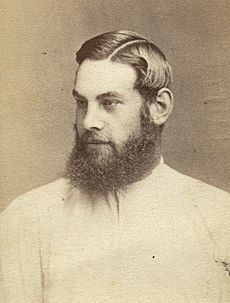
Grace and his brother Fred still lived with their mother. Their father had left enough money for the house. But the brothers needed to earn more from cricket for their medical studies. They did this by organizing matches for the United South of England Eleven. In 1872, Grace also toured North America.
In 1873, Grace became the first batsman to score a century before lunch in a first-class match. He made 134 runs. In the same season, he became the first player to achieve the "double." This means he scored 1,000 runs and took 100 wickets in one season. He did this eight times in his career:
- 1873 – 2,139 runs and 106 wickets
- 1874 – 1,664 runs and 140 wickets
- 1875 – 1,498 runs and 191 wickets
- 1876 – 2,622 runs and 129 wickets
- 1877 – 1,474 runs and 179 wickets
- 1878 – 1,151 runs and 152 wickets
- 1885 – 1,688 runs and 117 wickets
- 1886 – 1,846 runs and 122 wickets
In 1873, county cricket became more organized. Rules were made about where players could live. Grace's Gloucestershire team had a strong claim to be the "Champion County" that year. They shared the unofficial title with Nottinghamshire.
Record-Breaking Scores: 1874 to 1877
Grace toured Australia in the winter of 1873–74. He returned to England in May 1874 and quickly got back to playing. He had a very successful 1874 season. He completed his second "double." In 1875, he again completed the "double." This was his best season as a bowler.
One of Grace's best periods was in 1876. He scored his highest career score of 344 runs. This was for MCC against Kent. Two days later, he made 177 for Gloucestershire. Two days after that, he scored 318 not out for Gloucestershire. These two innings were against teams with very strong bowlers. In three straight innings, Grace scored 839 runs and was only out twice. His score of 344 was the first triple century in first-class cricket. It broke the record for the highest individual score, which had stood for 56 years. In 1877, Gloucestershire won the unofficial championship. This was thanks to another great season by Grace. He scored 1,474 runs and took 179 wickets.
Challenges and Comebacks: 1878 to 1886
There were rumors that Grace might stop playing cricket in 1878. He wanted to focus on his medical career. But he decided to keep playing. The first Australian team to tour England arrived in May. At Lord's, the Australians beat a strong MCC team, including Grace. This news caused a sensation.
There was some bad feeling between Grace and the 1878 Australians. This came to a head over a player named Billy Midwinter. Midwinter was Australian but had played for Gloucestershire. Grace and his brother E. M. convinced Midwinter to play for Gloucestershire instead of Australia. This led to a big argument. Grace even called the Australians "a damned lot of sneaks." He later apologized.
Despite these problems, Grace had a good season in 1878. He completed his sixth "double." He scored 1,151 runs and took 152 wickets.
Grace missed much of the 1879 season. He was finishing his medical qualification. He did not score 1,000 runs that year, but he did take 105 wickets. After becoming a doctor in November 1879, he had to focus on his new practice. This meant less cricket for the next five years. He also had mumps in 1882. He never topped the batting averages in the 1880s.
Grace was very sad when his brother Fred died in 1880. This happened soon after all three brothers played for England against Australia. Fred's death was a big reason why the Gloucestershire team declined. In 1882, Grace was part of the England team that lost the "Ashes Match" at The Oval.
In 1883, Grace missed a big match because of his medical work. Injuries limited his games in 1884. In 1886, Grace had his best bowling performance. He took 10 wickets for 49 runs for MCC. He also scored 104 runs in the same match. This was the last time he took 100 wickets in a season.
Later Career: 1887 to 1894
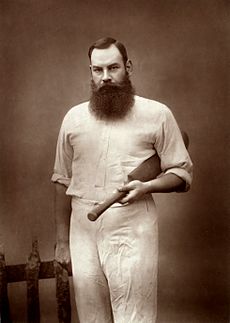
In 1888, Grace scored two centuries in one match against Yorkshire. He called this his "champion match." He bowled less in these years. From 1889, he only bowled sometimes. Injuries, especially a bad knee, affected him in the early 1890s. 1891 was his worst season. He scored no centuries and averaged only 19.76 runs.
Despite this, he was chosen to lead the England team to Australia in 1891–92. Australia won the three-match series 2–1. After his injuries and poor form, Grace improved in the next three seasons. He scored over 1,000 runs each time.
The "Indian Summer": 1895
Against all expectations, Grace had an amazing season in 1895. People called it his "Indian Summer." In May, he scored his hundredth century for Gloucestershire. His batting partner, Charles Townsend, said Grace was only flustered when he was close to this milestone. He then scored 1,000 runs in the month of May. This had never been done before. He scored 1,016 runs between May 9 and May 30. For the whole season, he scored 2,346 runs with nine centuries. He was 46 years old at the start of the season. Because of this incredible year, Grace was the only player to receive the Wisden Cricketers of the Year award for 1896.
Final Years in First-Class Cricket: 1896 to 1908
By his 50th birthday in July 1898, Grace was quite heavy. He was not as agile as before. This meant he was not a good fielder anymore. He was still a very good batsman. He could also be a useful slow bowler when needed. He was clearly nearing the end of his career. People now called him "The Old Man." The MCC arranged a special match for his 50th birthday. He scored 43 and 31 not out, even with a bad hand.
He stopped playing for England and Gloucestershire in 1899. He moved to South London and joined the new London County club. London County stopped being a first-class team in 1904. Grace played fewer games after that. His last game for the Gentlemen against the Players was in July 1906. Grace played his very last first-class match from April 20–22, 1908. He scored 15 and 25 runs.
Grace's Role in Gentlemen v Players Matches
Before Test cricket started in 1877, the Gentlemen v Players match was the most important game. Grace played for the Gentlemen against the Players from 1865 to 1906. He helped the amateur Gentlemen team compete with and often beat the professional Players. His skill at handling fast bowling was key. Before Grace, the Gentlemen had lost 19 games in a row. After he joined, they won 27 out of the next 39 games and lost only 4. He scored a record 15 centuries in these matches.
In 1870, Grace scored 215 runs for the Gentlemen. This was the first double century in a Gentlemen v Players match. Grace last played for the Gentlemen at Lord's in 1899. He continued to play for them at other places until 1906.
Grace and the Marylebone Cricket Club (MCC)
Grace became a member of the Marylebone Cricket Club (MCC) in 1869. The MCC was worried that Grace might join the professional players. They wanted him on their side to keep their power in cricket. Grace wore MCC colors for the rest of his career. Their red and yellow cap became as famous as his big black beard. He played for MCC for expenses only. But he was so in demand that he still made a lot of money.
In June 1870, Grace was the first doctor on the scene when a player named George Summers was hit on the head. Summers died four days later. Grace took his pulse and told him to leave the field. The Lord's pitch was known for being rough and dangerous back then.
Grace's Time with Gloucestershire
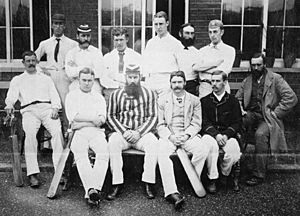
Gloucestershire County Cricket Club officially started in 1870. It grew from Dr. Henry Grace's West Gloucestershire club. Gloucestershire became a first-class team in June 1870. Grace and his brothers E. M. and Fred played for them. Gloucestershire quickly became one of the best teams in England. They were called "Champion County" in 1876 and 1877.
The Grace family ran the club. E. M. was the secretary, handling money. This later caused some problems. W. G., though only 21, was the team captain from the start. This was because he attracted so many fans.
In 1878, Grace played a match against Surrey. The ball got stuck in his shirt after he hit it. He used this chance to run several runs before fielders stopped him. He said he would have been out if he had removed the ball. They agreed to give him three runs.
In the 1880s, Gloucestershire's success faded. One reason was the early death of Fred Grace in 1880. The county team was not the same without him. Gloucestershire did not have enough money to hire good professional players. Other counties like Nottinghamshire and Surrey had stronger teams.
In 1899, Grace left Gloucestershire. He accepted an offer to help form the London County Cricket Club. He became the club's secretary, manager, and captain. He earned £600 a year.
Playing Abroad: Overseas Tours
Grace went on three overseas tours during his career. The first was to the United States and Canada in 1872. He and his amateur teammates easily beat the weaker teams they played. Grace made good friends on this tour, including George Harris. Grace called it "a prolonged and happy picnic."
Grace also visited Australia in 1873–74 as captain. This tour was not very successful. Grace's strong personality caused some problems. There was also bad feeling within the team. Grace treated the professional players differently. The team did not do well at first. They played 15 matches, but none are considered first-class.
Despite his injuries in 1891, Grace was chosen to captain England in Australia again. He led Lord Sheffield's team to Australia in 1891–92. Australia won the three-match series 2–1.
Grace's Test Cricket Career
Test cricket officially began in 1877. Grace was 28 then. He made his Test debut in 1880. He scored England's first-ever Test century against Australia. He played 22 Tests for England, all against Australia. He was always chosen for England's home games. But his only Test tour to Australia was in 1891–92.
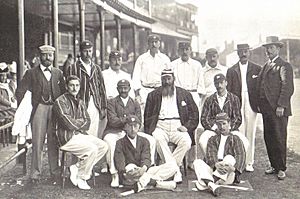
Grace's most famous Test match was England v Australia in 1882. Australia won by 7 runs. This led to the creation of The Ashes legend. Grace scored only 4 and 32 runs. But he is blamed for making the Australian bowler Fred Spofforth angry. This happened when Grace ran out an Australian player in a way that was legal but unsporting.
Grace's highest Test score was 170 runs. This was at The Oval in 1886. He also had a 170-run partnership with William Scotton.
There is a famous story about Grace and Australian bowler Ernie Jones in 1896. Jones bowled a very fast ball that seemed to go through Grace's beard. Grace reportedly asked the Australian captain: "Here, what's all this?" Jones said: "Sorry, doctor, she slipped." This incident likely happened in a tour match, not a Test.
Grace captained England in the First Test of the 1899 series against Australia. He was 51 years old. By this time, his size made him slow in the field. After the match, he realized his limits. He decided to step down from international cricket. He asked another selector if Archie MacLaren should play. When the selector said yes, Grace said: "That settles it." He later admitted that "the ground was getting a bit too far away" for him to field well.
Playing for London County
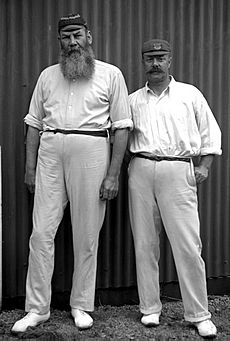
After ending his international career in 1899, Grace joined the new London County Cricket Club. This club played first-class matches from 1900 to 1904. Grace's presence attracted other top players like C. B. Fry. However, the club lost money. This was because the County Championship became more important. Also, Grace's skills naturally declined.
Still, Grace remained popular. He could still play well. In 1902, at age 54, he scored 1,187 runs in first-class cricket. He made two centuries. London County's last first-class matches were in 1904. The club closed in 1908.
Grace's Final Cricket Matches
Even in his old age, Grace continued to play minor cricket. His second-to-last match was for Eltham Cricket Club in July 1914. He was 66 years old. He scored 69 runs not out. His very last match was in August 1914. He did not bat or bowl in that game. This was a few days after World War I began.
Grace's Cricket Style and Approach
How Grace Played Cricket
Grace wrote two books about how to play cricket. He believed that cricketers are "not born" but are made through coaching and practice. He said his own skills came from constant practice as a boy. His uncle Alfred Pocock taught him a lot.
Grace said cricket should be fun. His family played in a "noisy and boisterous" way. W. G. and E. M. were known for being loud on the field. They were very competitive and always wanted to win. Sometimes, this went too far. This led to the gamesmanship for which they were often criticized.
Grace did not always get along with Australian players. He was seen as too focused on small rules. An Australian newspaper wrote that he was "surprisingly tenacious on very small points." Even his friend Lord Harris agreed that Grace's gamesmanship added to the stories about him. Grace "approached cricket as if he were fighting a small war." He wanted to win at all costs.
Grace's Batting Style
Many experts say Grace changed batting forever. He "revolutionized cricket" and developed most modern batting techniques. Before him, batsmen usually played either forward or back. Grace used both. He chose the best shot for each ball. One famous quote says he "turned the old one-stringed instrument [the cricket bat] into a many-chorded lyre." This means he added many more ways to hit the ball.
Cricket writer John Arlott said Grace "created modern cricket." Professional bowlers recognized his skill early on. Tom Emmett called him "a nonsuch" (without equal). He joked that Grace should play with a smaller bat.
Grace played on pitches that were often rough and uneven. There were no boundaries, so every hit had to be run. In 1895, the year of his "Indian Summer," new materials were used for pitches. This made them better and more lasting.
Grace learned to play straight and defend well. This was thanks to his uncle Alfred Pocock. He would block good balls and score off bad ones. As he got better, he became a powerful hitter. He had a full range of shots and scored runs easily. Even though he was an all-rounder, he was also an opening batsman.
Grace's Bowling Style
Grace's bowling style was older. He used a roundarm action. He was good at changing his speed. His slower balls curved in from the leg side. He always bowled with excellent length, meaning the ball landed in the right spot. He started with a fast-medium pace. But in the 1870s, he used a slower style with a leg break. He called his leg break a "leg-tweeker." He put only a little spin on the ball. He would often place a fielder at square leg to catch balls that came off the leg break. He kept his roundarm action even when most other bowlers switched to overarm.
Grace's Fielding Skills
When he was at his best, Grace was known for his amazing fielding. He could throw the ball very far. He once threw a cricket ball 122 yards (112 meters) in an athletics event. He said this skill came from his childhood. He used to throw stones at crows in the fields. Later in life, he said English fielding got worse. He blamed it on fewer country boys throwing stones.
Grace was also great at fielding his own bowling. After he bowled, he would quickly move to the left. This made him like an extra fielder. He caught some amazing balls this way. In his early career, he fielded at long-leg or cover-point. Later, he usually fielded at point. He was a fast runner and a safe catcher.
Grace's Amateur Status and Earnings
In January 1879, Grace and his brother E. M. faced questions about their expenses. They were accused of claiming too much money. This happened after a match where Billy Midwinter played for Gloucestershire. The Surrey team refused to pay their expenses. The Grace brothers managed to get through a difficult meeting. E. M. kept his job as club secretary. But they had to follow stricter rules.
This incident showed a problem with the Grace brothers' amateur status. Amateurs were not supposed to be paid. The MCC believed that a gentleman should not make money from cricket. Like other amateur players, they claimed money for travel and lodging. But there is a lot of proof that the Graces made more money than their actual expenses. W. G. especially "made more than any professional."
In his later years, he had to pay for a temporary doctor to run his medical practice while he played cricket. He was known for treating poor patients for free. He also received a salary as secretary and manager of the London County club. He received two national gifts of money. The first was £1,458 in 1879. The second was £9,703 in 1896. This was given to him after his amazing 1895 season.
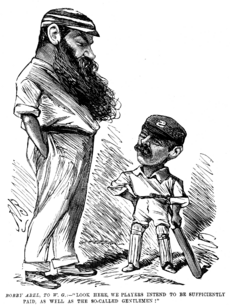
Even though Grace made money from cricket, he was very helpful to professional players. For example, when a player's benefit match was ruined by rain, Grace gave him money from his own fund. He also changed a match date so he could play in another player's benefit match. He knew his presence would attract more fans and money for that player.
After his father died in 1871, Grace and his brother Fred faced money problems. They were still living with their mother. They needed to earn money from cricket. Grace, as the organizer for the United South of England Eleven, would find gaps in the schedule. He would then put together a team to play matches where they could make a profit. It is thought that the team received £100 for a three-day match. The professional players got £5 each. Grace and Fred shared the remaining £45. Grace also claimed high expenses for playing for Gloucestershire (£15) and the Gentlemen (£20). He made a comfortable living from cricket. He earned much more than any professional player at the time. To compare, a domestic servant earned less than £50 a year.
Grace's Personal Life and Medical Career
Family Life and Becoming a Doctor
Grace kept his Gloucestershire accent even after living in London for years. His life, including cricket and medicine, was deeply connected to his close family. His father, Henry Grace, believed strongly in getting qualifications. He passed this on to his sons. Like his father and brothers, Grace chose a career in medicine. But because of his cricket, he did not become a doctor until 1879, when he was 31.
Grace married Agnes Nicholls Day in October 1873. She was his first cousin's daughter. Two weeks later, they went to Australia for Grace's cricket tour. They returned in May 1874, and their first son, William Gilbert junior, was born in July. Grace had to catch up on his medical studies. He and his family lived with his mother and siblings until 1875.
The Graces moved to London in February 1875. Grace was assigned to St Bartholomew's Hospital. Their second son, Henry Edgar, was born in London in 1876. A hospital ward at St. Bartholomew's used to be named "W. G. Grace Ward." In 1877, the family moved back to Gloucestershire. Grace's studies were at a key point. Agnes became pregnant again, and their daughter Bessie was born in 1878.
After the 1878 cricket season, Grace went to Westminster Hospital Medical School. This was for his final year of medical practice. He played less cricket that year. In November 1879, Grace finally became a doctor. He received his diploma from the University of Edinburgh. He became a Licentiate of the Royal College of Physicians (LRCP) and a Member of the Royal College of Surgeons (MRCS).
After qualifying, he worked in his own practice in Easton, a poorer area of Bristol. He hired two temporary doctors during the cricket season. He also worked as a public vaccinator and a medical officer. He helped patients in the workhouse. Many patients said he was a good doctor. Poor families knew they would not get bills from him.
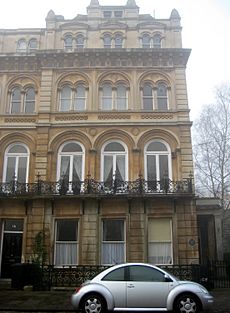
The family lived in four different homes near his practice over the next twenty years. Their fourth child, Charles Butler, was born in 1882. After leaving Gloucestershire in 1900, the Graces lived in Mottingham, a suburb of south-east London. This was near Crystal Palace, where he played for London County. It was also near Eltham, where he played club cricket in his sixties. A blue plaque marks their home in Mottingham Lane.
Sad Times in Grace's Life
Grace faced several sad events in his life. His father died in December 1871. He was very upset by the early death of his younger brother Fred in 1880. This happened just two weeks after all three brothers played a Test match for England. In July 1884, Grace's rival A. N. Hornby stopped a match. This was so E. M. and W. G. could go home. Their mother, Martha Grace, had died at age 72.
The biggest sadness for Grace was losing his daughter Bessie in 1899. She was only 20 and died from typhoid. She was his favorite child. Then, in February 1905, his oldest son, W. G. junior, died from appendicitis at age 30.
On August 26, 1914, Grace wrote a letter to The Sportsman newspaper. He called for the cricket season to end immediately. He wanted all first-class cricketers to serve their country in World War I. This was after news of casualties from the Battle of Mons. His letter was published the next day. But it did not immediately stop the cricket season. Grace was reportedly very upset by the war. He would shake his fist and shout at German Zeppelins flying over his home.
Grace died at Mottingham on October 23, 1915. He was 67 years old. He had a heart attack. His death shocked the nation. He is buried in the family grave at Beckenham Cemetery, Kent.
Grace's Lasting Impact on Cricket
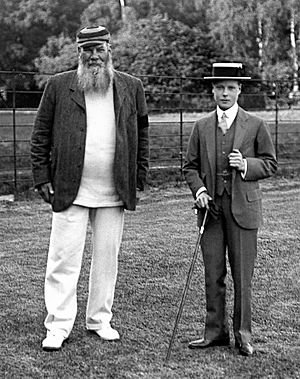
The MCC published a special book about Grace's life in 1919. In 1923, the W. G. Grace Memorial Gates were built at Lord's cricket ground. They were designed by Sir Herbert Baker. Sir Stanley Jackson suggested adding the words The Great Cricketer to the dedication. On September 12, 2009, Grace was added to the ICC Cricket Hall of Fame at Lord's.
Grace was so famous that his image was even used in the movie Monty Python and the Holy Grail as "the face of God." Many people called him "The Great Cricketer." H. S. Altham said he was "the greatest of all cricketers." John Arlott called him "timeless."
C. L. R. James, a writer, said Grace was "the best-known Englishman of his time." He compared him to Queen Victoria and William Ewart Gladstone in terms of fame. James wrote that Grace "transformed cricket into a national institution."
The first Playfair Cricket Annual in 1948 celebrated Grace's 100th birthday. It called him "King in his own domain." It said he "pulverised fast bowling" and "astonished the world" in 1895. C. B. Fry wrote that Grace would never have expected to lose a match. He would always try his best to win.
In 1963, Wisden Cricketers' Almanack chose Grace as one of the Six Giants of the Wisden Century. This was for their 100th edition. The other giants were Sydney Barnes, Don Bradman, Jack Hobbs, Tom Richardson, and Victor Trumper. In 2013, Wisden also named him in an all-time Test World XI.
Derek Birley wrote that Grace's death in 1915 felt like the end of an era. Rowland Bowen said that Grace's achievements were "phenomenal" for his time. David Frith said Grace's influence lasted long after he stopped playing. For decades, Grace was "arguably the most famous man in England." He was easy to recognize because of his beard and size. He was respected for his batting. Frith added that even though Grace's records have been broken, his importance has not. Grace "remains the most famous cricketer of them all." He was the one who made the game more respected by the public.
A pub named after Dr. Grace was built next to his grave in Beckenham Cemetery.
See also
 In Spanish: W. G. Grace para niños
In Spanish: W. G. Grace para niños
 | Georgia Louise Harris Brown |
 | Julian Abele |
 | Norma Merrick Sklarek |
 | William Sidney Pittman |


